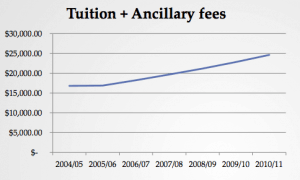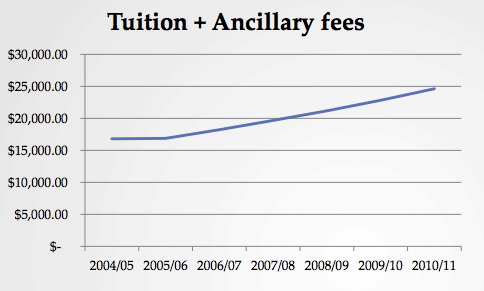I talked and wrote a lot while I was at U of T about our Law School’s tuition. In retrospect, I’m not so proud of this. Why? Because all I did was write and talk, and that wasn’t enough.

In this article, I’m not going to throw any more statistics at you about how tuition and faculty salaries have increased over the years, while financial aid and the diversity in the student body have not. Ask your SLS representatives for the quantitative information on this. Ask your peers or those who have recently graduated about their debts. These stories shouldn’t be dismissed as anecdotal evidence; they’re about our lives.
To see the effects of high tuition, look around the Rowell Room, and then go to Hart House or Osgoode Hall and look around. The mere visual difference between our student bodies is appalling and unjustifiable. Meanwhile our law school claims to be of an “international” calibre, and it’s located in Canada’s most diverse city.
Last year, Ultra Vires ran a contest to find the most White Anglo Saxon Protestant (WASP) student at our school. Through institutionally self-deprecating jokes like this, we acknowledge the elephant in the room, and who’s been left out. The fact that many of us only feel comfortable addressing the issue through humour demonstrates that it is an issue that deserves to be openly discussed. We feel uncomfortable about the situation because we know that it’s wrong; therefore, we should talk about changing it.
High tuition presents barriers to different groups of people which aren’t perceived as mere lines on a balance sheet; as a friend of mine put it: if no one in your family has made more than $25,000 in a year, then spending that much to get only a year’s instruction at law school is almost inconceivable.
Barriers to getting into law school are also barriers to entering the legal profession. On the first day of law school you were told that your classmates will be leaders in law, politics and business; we will interpret the law, create it, and will make the business transactions that drive the economy. By making law school financially inaccessible, we are making access to this kind of power inaccessible, and this inaccessibility will exacerbate the exclusions faced by historically disadvantaged groups of people.
In addition to front end-inaccessibility, high tuition also results in back-end inaccessibility to entering certain fields of the profession. In first year, a friend of mine talked about the financial pressure she already felt to accept a few years in “slavery on Baystreet” so that she would be able to pay off her debt. She works there now at what is considered to be a reputable firm. Her story is so far from unique at U of T it sounds like a cliché. Unfortunately, this sort of pressure which steers people into certain fields of the profession doesn’t only have an individual effect, it also has social effects. As put by Noam Chomsky on March 19, 2012, when asked for his thought on the Quebec student movement:
High tuition is not an economic necessity, as is easy to show, but a debt trap is a good technique of indoctrination and control. And resisting this makes good sense.
U of T prides itself in leading the country’s common law schools on several fronts. However, little is said about how it is also the leader in a trend across the country of increasing the gap between tuition and financial aid. U of T will hold a greater share of responsibility for the exclusions to the legal profession that arise from this trend it is leading.
If all you’re ever willing to do is write on a subject, you’ll never do anything. This is a tough pill for people in the legal profession to swallow, but it’s true. I don’t think we appreciate it as we can rely on our clients to do things and put themselves on the line for us. It’s people like Rodriquez, Roncarelli, or those working at InSite in Vancouver’s Downtown East-Side who push the law. We advocate for them, but the risk is theirs.
Matters of the legal profession are different. There are no clients who will champion our cause. We are a self-regulating profession. Therefore, lawyers of the current generation hold significant power over who will make up the next generation. Likewise, only the current generation of law students at U of T can act to ensure accessibility for the next.
When I was an SLS representative, I thought we could convince the UTSU to fight this battle for us. I also thought we could convince the Dean through patient discussion and reasoned analysis that she should stop increasing the gap between tuition and financial aid. I was naïve. Meanwhile, the SLS kept our fight internal. This was ineffective. In order to move the Dean and Faculty Council, we have to engage with this issue strongly, loudly and publicly. The Dean and Faculty Council will respond when the students of U of T publicly call the buck on the school’s increasing inaccessibility
Here are two things you can do now with or without the assistance of the SLS:
- Start a public petition to be signed by current law students, alumni, and members of the community protesting financial inaccessibility at U of T;
- Engage in a one day strike action. Grading is done on a curve. If no one goes to class, then no one falls behind the pack when it comes to being prepared for final examinations. If you’re concerned about missing a class you paid hundreds of dollars for, you should be even more concerned about the fact that in a few years it may cost hundreds more. If you’re worried that some students will get the upper hand on you by attending class, I urge you to think about the more important things at stake.
Doing either would: educate, draw attention, apply pressure, and would be fun.
Students in Quebec helped topple a government over the issue of tuition. If you’re more than $10,000 in debt right now for following a dream about justice, you should be furious. In being here, you’ve already proven that you’re brilliant, and that you have the potential to lead this profession. Be a leader now. My only regret from U of T is that I wasn’t when I should have been one. Now, go grab some casseroles dishes and do something about this.






